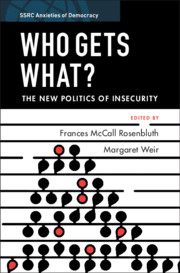Book contents
- Who Gets What?
- SSRC Anxieties of Democracy
- Sponsored by the Social Science Research Council
- Who Gets What?
- Copyright page
- Contents
- Figures
- Tables
- Author Biographies
- Acknowledgments
- 1 Introduction
- Part I People
- Part II Places
- Part III Politics
- 9 Electoral Realignments in the Atlantic World
- 10 Political Parties in the New Politics of Insecurity
- 11 The Peculiar Politics of American Insecurity
- 12 The Anxiety of Precarity
- 13 Increasing Instability and Uncertainty among American Workers
- Index
- References
11 - The Peculiar Politics of American Insecurity
from Part III - Politics
Published online by Cambridge University Press: 20 August 2021
- Who Gets What?
- SSRC Anxieties of Democracy
- Sponsored by the Social Science Research Council
- Who Gets What?
- Copyright page
- Contents
- Figures
- Tables
- Author Biographies
- Acknowledgments
- 1 Introduction
- Part I People
- Part II Places
- Part III Politics
- 9 Electoral Realignments in the Atlantic World
- 10 Political Parties in the New Politics of Insecurity
- 11 The Peculiar Politics of American Insecurity
- 12 The Anxiety of Precarity
- 13 Increasing Instability and Uncertainty among American Workers
- Index
- References
Summary
The growing insecurity of American households is often seen as an exogenous economic change beyond political control. In this chapter, we argue instead that it is to a very large extent a result of endogenous political and policy developments. Moreover, we suggest that many, though certainly not all, of these developments are specific to the United States. In particular, we focus on three: (1) the erosion of America’s distinctive framework of social provision, which is uniquely reliant on private risk pooling by employers; (2) the weakness of social solidarity and resonance of racial (rather than class) appeals in our increasingly polarized society; and (3) the growing extremism of the Republican Party, enabled and propelled by its capacity to forge an uneasy “plutocratic-populist” coalition of upscale economic conservatives and downscale social conservatives. Understanding these three developments is essential to grasping not just how America insecurity arose but also whether it might yet be addressed.
- Type
- Chapter
- Information
- Who Gets What?The New Politics of Insecurity, pp. 259 - 280Publisher: Cambridge University PressPrint publication year: 2021

